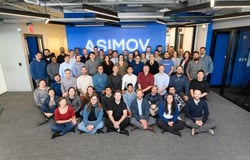OXMAN
OXMAN is a hybrid Design and R&D company that fuses design, technology, and biology to invent multi-scale products and environments. The fusion of disciplines within our work opens previously impossible opportunities within each domain—allowing design to inspire science and science to inspire design.
At OXMAN, we question dominant modes of design that have divorced us from Nature by prioritizing humanity above all else (human-centric design). Although it is design that has caused this rift, we believe that design also offers the greatest opportunity to heal it.
We propose a Nature-centric approach that delivers design solutions by, for, and with the natural world, while advancing humanity. In this pursuit, we reject all forms of segregation and instead call for a radical synergy between human-made and Nature-grown environments.
This approach demands that we design across scales for systems-level impact. We consider every designed construct a whole system of heterogeneous and complex interrelations—not isolated objects—that are intrinsically connected to their environments. In doing so, we open ourselves up to moving beyond mere maintenance toward the advancement of Nature.
Summary
OXMAN is seeking a Full-Stack Embedded Systems Engineer to join an all-star interdisciplinary team of deep thinkers and brilliant makers. This person thrives at the intersection of electrical design, software, firmware, printed circuit board (PCB) design, and sensor integration, grounded by a strong foundation in physics, mathematics, and core engineering disciplines. They demonstrate creativity and originality in problem-solving and problem-seeking, alongside an interest in materials sciences and biological processes. In this role, they will expertly build and test a variety of circuits, devices, and appliances for scientific analysis across scales and domains, leveraging fluency in a variety of programming languages for technology development.
Successful applicants embody stellar technical skills, hold the capacity to navigate and resolve uncertainty, and demonstrate a unique “language” of biology (wetware) / computing (software) / fabricating (hardware), or a combination thereof. They have produced and can present a prolific corpus of research and experimental demonstrations rooted in sound scientific approaches and process-driven design; exemplify a passion for systems-based thinking with a wide range of potential applications for their work; personify an appreciation for engineering, science, and art; and seek synergy between biology and technology in research, practice, and direct industrial utility.
Core responsibilities
- Support the design and building of electronic, software, and embedded (microcontroller-based) instruments, architectures, devices, and products according to experimental specifications, from concept development to product deployment
- Support integrated teams as the “hands-on” full-stack support for all electrical engineering and computer science (EECS) needs
- Maintain high-quality documentation of scientific output and research in the forms of written reports, electronic lab notebooks, internal databases, code comments, etc.
- Actively seek opportunities to publish work in top-tier journals and other platforms for diffusing scientific knowledge
- Nurture and augment the scientific vision of OXMAN, upholding core design principles and ensuring the highest and most innovative quality of work
- Actively partner with a multidisciplinary team of professionals, including other biologists, engineers, and designers, across scientific and design pursuits
- Communicate ideas, work, and progress clearly, including by engaging in team meetings, presentations, and other creative communication outlets
Qualifications & competencies
- BS, MS or PhD degree in electrical engineering, computer science, or related fields (e.g., physics, applied biology, computational design, biodesign, robotics)
- Minimum 5 years of experience building various classes of tools and technology for electrical engineering, software, and embedded systems
- Portfolio of highly successful engineering and design work from conceptualization to implementation, demonstrating out-of-the-box thinking and stellar taste
- Mastery of relevant engineering tools and techniques, including PCB design, SPICE modeling, simulation software for electrical systems, digital and physical fabrication equipment for electronics, and the interplay of EECS with industrial design
- Fluency in a variety of programming languages (e.g., Python, Java, C, C++, SQL)
- Experience with relevant manufacturing tools and sourcing materials
- Knowledge of precision design processes, common measurement technologies, and means of production of scientific equipment is a plus
- Ability to thrive in a fast-paced entrepreneurial environment
- Excellent project management skills, independence, self-motivation, organizational skills, and attention to detail
- Strong commitment to the team; maintains positive working relationships with diverse people, including internal team and external partners
- Embodies ethics and integrity in all work with impeccable scientific integrity, respecting both company and broader community policies in all conduct
OXMAN does not discriminate on the basis of race, color, religion, sex, national origin, age, disability, genetic information, or any other legally protected characteristics.
NYC Salary Range: $75,000–$138,000
Salary is based on a number of factors including job-related knowledge, skills, experience, and other business and organizational needs. Our compensation package also includes variable compensation in the form of year-end bonuses, benefits, immigration assistance, and equity participation.
Top Skills
What We Do
Envision a future of complete synergy between Nature and humanity, where human-made and Nature-grown become indistinguishable.
OXMAN is a new kind of company fusing design, technology, and biology to invent multi-scale products and environments—allowing design to empower science and science to empower design. As activist designers, we call for a fundamental shift from human-centric design to Nature-centric design. Categorical delineations between climate change and global pandemics, loss of biodiversity and loss of empathy for one another give way to authoring systems that address manifold challenges. Through this shift, we open ourselves up to moving beyond mere maintenance of Nature toward its radical betterment





.JPG)
.png)

